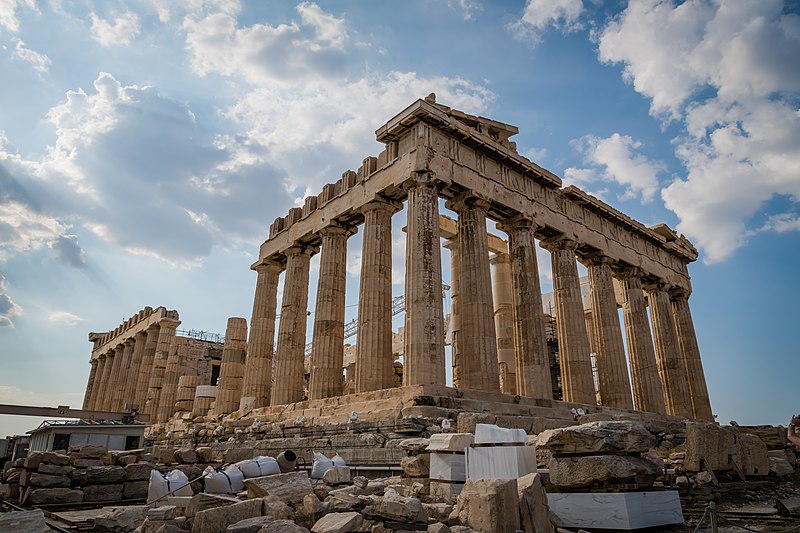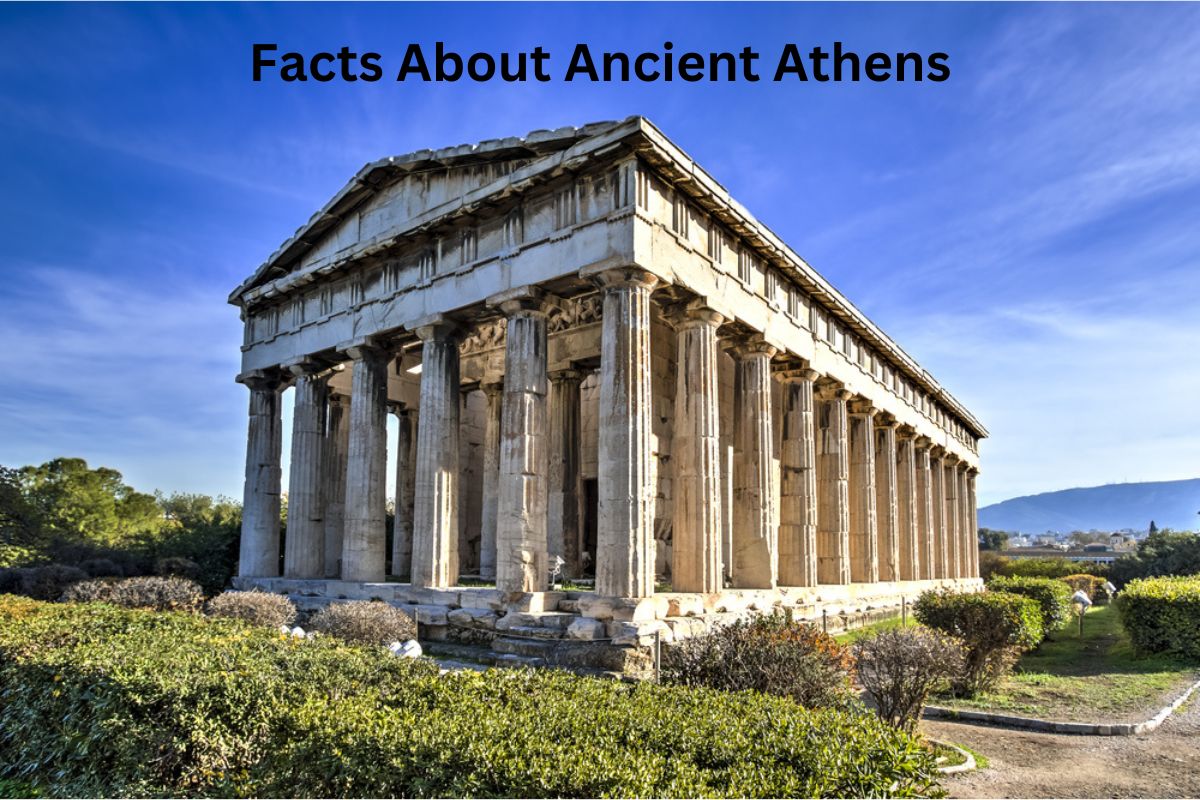Ancient Athens, one of the most influential city-states in ancient Greece, emerged in the 8th century BCE and reached its height during the 5th century BCE, known as the Golden Age of Athens. Renowned for its democratic government, Athens fostered a culture of intellectual and artistic excellence.
Philosophers like Socrates, Plato, and Aristotle emerged from Athens, leaving a lasting impact on Western philosophy. The city’s artistic achievements, including the works of famous playwrights, and its architectural marvels, such as the Parthenon on the Acropolis, showcased its cultural prowess.
Athens thrived economically through trade, manufacturing, and agriculture, and its educational system emphasized the value of knowledge.
However, slavery was deeply ingrained in Athenian society. Athens also experienced significant conflicts, including the Persian Wars and the Peloponnesian War, which shaped its history and influence in ancient Greece.
Ancient Athens Facts
1. Ancient Athens emerged in the 8th century BCE
Ancient Athens emerged in the 8th century BCE as a city-state in the region of Attica, Greece. It developed gradually from small agricultural settlements into a powerful urban center.
Also Read: Facts About the Parthenon
The establishment of Athens is attributed to the mythical figure of Theseus, who unified the various communities in the area.

2. It was known for being a democracy, though limited to male citizens
Athens is famous for being one of the earliest known examples of a democratic government. In the 5th century BCE, it became a direct democracy, where eligible male citizens could participate in the decision-making process.
Also Read: Acropolis Facts
This was achieved through various institutions such as the Assembly, where citizens gathered to debate and vote on issues, and the Council of 500, a group of representatives responsible for proposing and implementing laws.
3. Athens was a hub of intellectual and cultural achievements
Athens was a hub of intellectual and cultural achievements during its Golden Age, which took place in the 5th century BCE. This period saw a flourishing of arts, literature, and philosophy. It was a time of great advancements in various fields, including architecture, sculpture, drama, and philosophy.
4. Prominent philosophers like Socrates, Plato, and Aristotle were from Athens
Prominent thinkers like Socrates, Plato, and Aristotle emerged in Athens and their ideas shaped Western philosophy for centuries to come.
The city became a center for learning, attracting scholars from different parts of Greece and beyond. The cultural achievements of ancient Athens continue to influence modern thought and art.

5. The city was renowned for its arts and literature, including famous playwrights
Athens was renowned for its arts and literature, and it produced some of the most famous playwrights in history. Playwrights like Aeschylus, Sophocles, and Euripides wrote tragic plays that explored profound themes such as fate, morality, and the nature of humanity.
These plays were performed in open-air theaters during religious festivals, with the most prestigious being the Dionysia festival. The works of these playwrights continue to be studied, performed, and appreciated around the world.
6. The Acropolis was a prominent hilltop with the Parthenon as its most famous structure
The Acropolis, a fortified hilltop in Athens, was the focal point of the city’s religious and civic life. The most iconic structure on the Acropolis is the Parthenon, a temple dedicated to the goddess Athena, the patron deity of Athens.
Built in the 5th century BCE, the Parthenon is an architectural masterpiece and a symbol of ancient Greek civilization. It features intricate sculptures and decorative elements that exemplify the skill and artistry of the time.
Other notable buildings on the Acropolis include the Erechtheion and the Propylaea.
7. Athens had a thriving economy based on trade, manufacturing, and agriculture
Athens had a diverse and thriving economy. Its strategic location near the Aegean Sea allowed it to develop into a significant trading hub. The Athenians engaged in both maritime and overland trade, importing goods such as grain, timber, and metals, and exporting pottery, olive oil, and other products.
The city’s manufacturing sector produced goods like textiles, metalwork, and pottery, which were highly valued and traded throughout the Mediterranean. Additionally, Athens had fertile agricultural land, and the cultivation of olives, grapes, and grains played a vital role in the city’s economy.
Athens also had a powerful navy, which safeguarded its maritime trade routes, protected its interests, and enabled the establishment of colonies across the Mediterranean.

8. Education was highly valued for boys, while girls were primarily taught household skills
Education was highly valued in Athens, particularly for boys. At the age of seven, boys would begin their formal education. They attended schools called “grammars” where they learned subjects like reading, writing, mathematics, music, and physical education.
The goal of education was to produce well-rounded individuals who could actively participate in civic life. The most prominent philosopher of the time, Socrates, emphasized critical thinking and questioning as important aspects of education.
For girls, education focused primarily on domestic skills and preparing them for marriage and motherhood. They were taught tasks like weaving, spinning, and managing household affairs. Girls did not have access to formal schooling and were generally not expected to participate in public life or politics.
9. Slavery was widespread in Athens, with slaves performing various tasks
Slavery played a significant role in Athenian society. Slaves, known as “douloi,” were acquired through various means such as war, trade, or as a result of indebtedness. Slaves performed a wide range of tasks, including domestic chores, agricultural work, and skilled labor.
They had no rights and were considered the property of their owners. Slavery was an integral part of the Athenian economy and social structure, with wealthy households employing numerous slaves to maintain their lifestyles.
10. Athens engaged in notable conflicts such as the Persian Wars and the Peloponnesian War
Athens engaged in significant wars throughout its history. One of the most famous conflicts was the Persian Wars (499-449 BCE), in which Athens played a vital role in defending Greece against the invading Persian Empire. Athens, along with other Greek city-states, won decisive victories in battles such as Marathon, Salamis, and Plataea.
However, Athens later faced a protracted conflict with its rival city-state, Sparta, known as the Peloponnesian War (431-404 BCE). This war, fought between the Peloponnesian League led by Sparta and the Delian League led by Athens, resulted in Athens’ eventual defeat and marked the end of its dominance in Greece. The war had far-reaching consequences, leading to a decline in Athenian power and influence, and a shift in the balance of power within ancient Greece.
